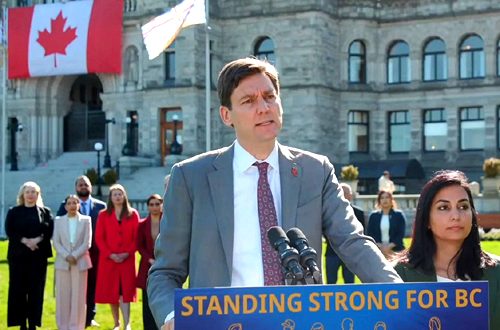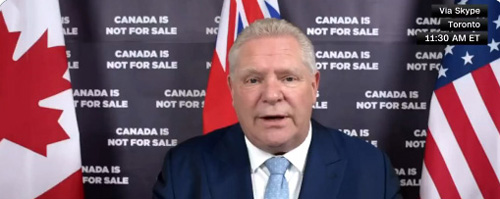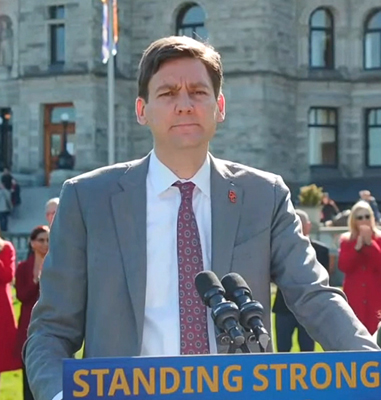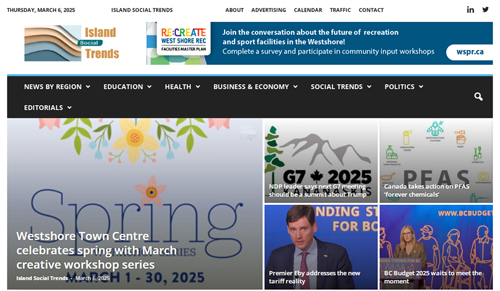
Thursday March 6, 2025 | VICTORIA, bC
by Mary P Brooke | Island Social Trends
“Trump wants to eliminate the border. He wants to annex Canada and turn us into the 51st state,” said BC Premier David Eby today.
He was addressing media and the public out front of the BC Legislature on the front lawn at the noon hour. He announced some upcoming legislation to eliminate internal trade barriers, in order “to respond to a rapidly escalating and changing situation”.
Trump’s 51st state threat:
“That is not an invitation, that is a threat to Canada,” said Eby today about US President Donald Trump’s continual taunting about Canada becoming a 51st state of the United States.
“It is intended to weaken our resolve and it will not work,” said Eby today.
“Elbows up,” was part of Eby’s motivational remarks today, referring to how hockey players use an ‘elbows up’ signal when they’re intending to take on a tough fight with the opposing team.
“We can’t back off until the threat is gone,” said Eby. “These tariffs are a profound mistake,” said Eby, after calling Trump an unreliable president.
“Even after the threat is gone we will redouble our efforts,” said Eby with regard to trade diversification both across Canada and with other parts of the world.
Team Canada approach:

Eby noted that Ontario Premier Doug Ford is going ahead with 25% tariffs on the export of electricity to three northeast US states (Minnesota, New York and Michigan) starting next week.
“We will work with Premier Ford, with the prime minister, and a Team Canada approach to ensure that if we are looking at energy export tariffs that it’s done in a coordinated way across the country,” said Eby today.
Ford is presently the Chair of the Council of the Federation (Canada’s 13 Premiers).
“We need to ensure we’re protecting British Columbians while we’re retaliating against the Americans,” said Eby today, acknowledging there will be impacts on British Columbians including possibly the cost of electricity.
Long-term restructuring:
He wants British Columbia to benefit in the long-term from the permanent restructuring of trade across the country “so we’re never in this position again”, Eby told media today.
“We are responding to this unprecedented attack with several targeted measures and in the coming weeks we will arm ourselves with even more tools as next steps to fend off a sustained economic aggression.”
Eby wants Trump to sit down with Canada “like grown ups” to sort out the president’s trade concerns
Meanwhile, Eby says that “the uncertainty is devastating to the Canadian economy and the US economy, it’s hurting everyone — it’s time to move on”.
===== RELATED:
NEW SECTIONS: CANADA-USA | CANADA-NATIONAL | BC-NATIONAL | TARIFFS & TRADE
Premier announces new measures to defend B.C. from Trump tariffs
March 6, 2025
VICTORIA – Premier David Eby has announced new tariff-response measures with the intention of bringing forward legislation that will defend British Columbians, workers and businesses from U.S. President Donald J. Trump’s tariffs on Canadian goods and energy.
“The White House started a trade war we didn’t want, and we must answer with strength,” Premier Eby said. “We are responding to this unprecedented attack with several targeted measures and in the coming weeks we will arm ourselves with even more tools as next steps to fend off a sustained economic aggression.”

The B.C. government intends to introduce tariff-response legislation in the coming days that will give the Province new tools to defend B.C. jobs and businesses and respond swiftly and nimbly to emerging challenges brought on by Trump’s trade war. This would enable a range of responses, including the ability to remove interprovincial trade barriers, mandating that low-carbon fuels added to gasoline and diesel be produced in Canada, and allowing B.C. to apply tolls/fees to U.S. commercial vehicles using B.C. infrastructure to travel to Alaska.
“The tariffs imposed by Trump are a profound mistake and are hurting families on both sides of the border,” Premier Eby said. “My team will continue to work hard every day to defend British Columbians through this and come out stronger on the other side. Every option is on the table.”
The Province’s initial response to tariffs includes directing the BC Liquor Distribution Branch to immediately stop buying American liquor from “red” states and remove red-state brands from the shelves of public liquor stores. The B.C. government and Crown corporations have also been directed to buy Canadian goods and services first.
The counter-measures are a first step and part of a Team Canada approach that includes 25% tariffs on $155 billion worth of imported U.S. products imposed by the federal government, as well as additional measures from other provinces and territories.
First ministers have also agreed to take meaningful action to reduce barriers to internal trade and labour mobility by June 1, 2025. The B.C. government’s plan to fight back against the tariffs and defend British Columbians includes:
- 1. responding to U.S. tariffs with tough counter-actions and outreach to American decision-makers;
- 2. strengthening B.C.’s economy by expediting projects and supporting industry and workers; and
- 3. diversifying trade markets for B.C. products so British Columbia is less reliant on U.S. markets and customers, including by breaking down domestic trade barriers.
As part of this approach, B.C. is moving full steam ahead on new actions to seize economic opportunities and find new trade markets to reduce B.C.’s reliance on the U.S.
The Province is accelerating approvals and permits on major projects that are ready to move forward to create good jobs and support B.C.’s economy in the face of tariffs. The initial list of projects is valued at $20 billion in investment and is expected to create 8,000 family-supporting jobs, especially in rural and remote communities.
To support B.C.’s strong tariff response and ensure actions are swift, responsive and coordinated, Premier Eby has established a trade and economic security task force to bring together business, labour and Indigenous leadership. A new task force on agriculture and the food economy will help ensure B.C.’s food supply and food economy continue to grow in the face of tariffs, a B.C. softwood advisory council is developing a diplomatic and trade strategy to fight for B.C.’s interests in the ongoing softwood lumber dispute, and a new cabinet committee is co-ordinating the whole-of-government approach the Province is taking.
Quick Facts:
- Estimates indicate 25% tariffs on Canadian mineral exports will cost American companies more than US$11 billion and have a profound effect on the U.S. defence industry, energy production and manufacturing.
- The share of B.C.’s goods exports to the U.S. dropped to 52.8% in 2024, compared to 65.8% in 2000. At the same time, B.C. has expanded its trade relationships with key Asian markets, including China and South Korea.
- In comparison, approximately 88% of Alberta’s goods exports and an average of 76.1% of Ontario and Quebec’s goods exports went to the U.S. in 2024. This places B.C. in a relatively better position than other provinces when it comes to mitigating the impacts of U.S. tariffs. However, the impact would still be significant.
- Some sectors are more reliant on the U.S. for exports. For example, in 2024, B.C. exported all its natural gas and electricity and 74.8% of its softwood lumber to the U.S.
- For goods coming into B.C., U.S. imports make up 34.5% of total incoming trade, including machinery and equipment, agriculture and food, as well as energy products










